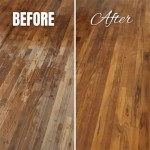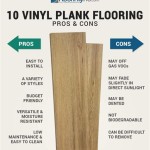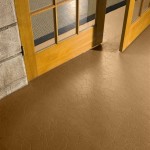The Benefits and Drawbacks of Laminate Kitchen Flooring
Laminate kitchen flooring is a popular choice for homeowners due to its durability, affordability, and ease of installation. However, it's important to weigh the pros and cons before making a decision to install laminate flooring in your kitchen.
Benefits of Laminate Kitchen Flooring
Durability: Laminate flooring is highly durable and can withstand heavy foot traffic, spills, and scratches. It's a great choice for families with pets or children. Affordability: Laminate flooring is one of the most affordable flooring options available. It's significantly less expensive than other materials like hardwood or tile. Easy Installation: Laminate flooring is relatively easy to install, even for DIY enthusiasts. It can be installed as a floating floor, which means it doesn't require glue or nails to secure it to the subfloor. Variety of Styles: Laminate flooring comes in a wide variety of colors, patterns, and finishes, making it easy to find a style that matches your kitchen décor. Easy Maintenance: Laminate flooring is easy to clean and maintain. It can be swept, vacuumed, or mopped with a damp microfiber cloth.Drawbacks of Laminate Kitchen Flooring
Not Waterproof: Laminate flooring is not waterproof and can be damaged by standing water. Therefore, it's not recommended for areas like kitchens or bathrooms where spills and moisture are common. Susceptible to Scratches: While laminate flooring is durable, it can be scratched by sharp objects like pet claws or furniture legs. Can Be Noisy: Laminate flooring can be noisy when walked on, especially if it's installed over a hard subfloor. May Not Add Resale Value: Laminate flooring generally does not add as much resale value to a home as other flooring materials like hardwood or tile.Important Considerations
In addition to the pros and cons, there are a few other important considerations to keep in mind when evaluating laminate kitchen flooring: Moisture Resistance: Look for laminate flooring with a high moisture resistance rating if you're considering installing it in a moisture-prone area. Underlayment: Installing laminate flooring over a quality underlayment is crucial for sound insulation, moisture protection, and comfort. Acclimation: Before installing laminate flooring, allow it to acclimate to the temperature and humidity of your kitchen for at least 48 hours. Warranties: Most laminate flooring manufacturers offer warranties that cover defects and premature wear. Be sure to read the warranty carefully before making a purchase.Conclusion
Laminate kitchen flooring offers both benefits and drawbacks. It's a durable, affordable, and easy-to-install option that comes in a wide range of styles. However, it's important to consider its susceptibility to water damage, scratching, and noise before making a final decision. By weighing the pros and cons carefully and taking the necessary precautions, you can determine if laminate flooring is the right choice for your kitchen.
Pros And Cons Of 5 Popular Kitchen Flooring Materials

Laminate Flooring Pros And Cons Direct Wood

Vinyl Vs Laminate Flooring Pros Cons And Differences 2024 Forbes Home

Benefits Of Laminate Flooring Pros Cons Ids

Engineered Flooring Vs Laminate Everything You Need To Know Forbes Home

Laminate Vs Hardwood Flooring Major Differences Forbes Home

Waterproof Laminate Flooring Review Pros And Cons

What Is A Floating Floor Pros And Cons Esb Flooring

Luxury Vinyl Vs Laminate Flooring Pros And Cons The We Chose Angela Marie Made

Laminate Vs Carpet Flooring Major Differences Pros Cons And Costs Forbes Home
See Also







